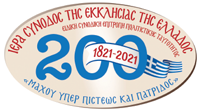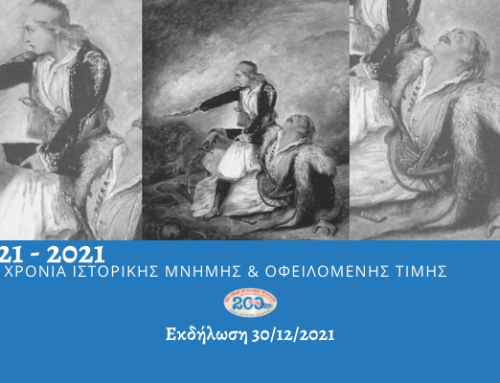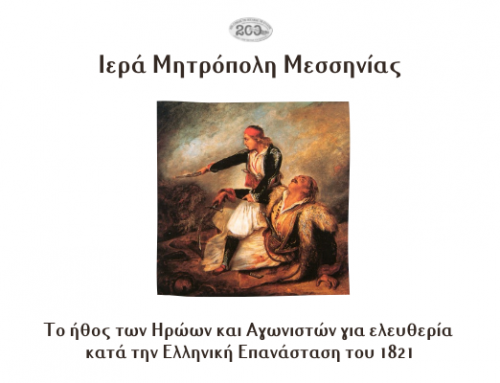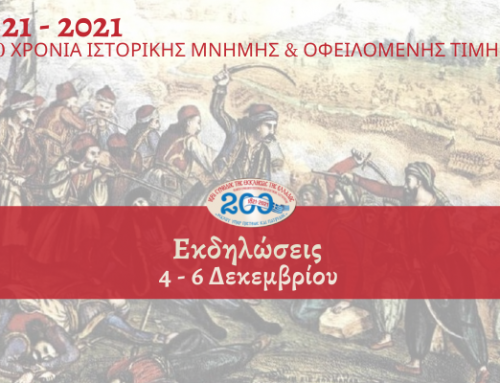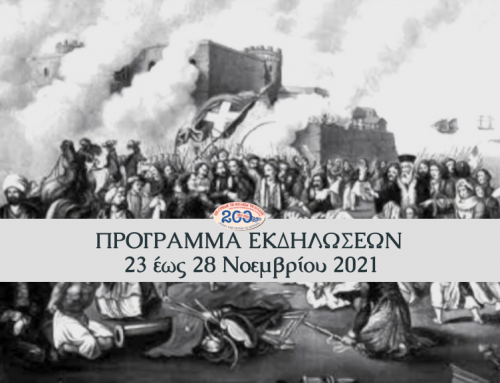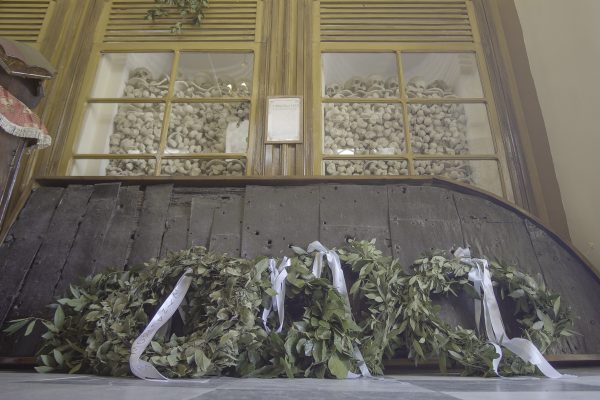
The thousands of people slaughtered on the island of Chios, the women and children carted off to slave markets, the destruction of the natural environment, the plundering, depredation and other acts of violence lasted for many days at Easter of 1822 and marked an event which awakened Western Europe, inspired a movement of Philhellenism throughout Europe, including the moving poem “L’Enfant” by Victor Hugo (“Les turcs ont passé là. Tout est ruine et deuil. | Chio, l’île des vins, n’est plus qu’un sombre écueil …”, July 8-10, 1828, Les Orientales) and the famous painting by Eugène Delacroix “Scènes des massacres de Scio : familles grecques attendant la mort ou l’esclavage” (1824, Louvre Museum).
On Tuesday of the Bright Week, May 04, 2021, Most Rev. Metropolitan Markos of Chios, Psara and Oinoussai performed an Archieratical Divine Liturgy in the site of the great slaughter, the Holy Monastery of Saint Menas and subsequently a Memorial Service before the relliquary of the martyrs of Chios, during which wreaths were laid by the local political and military authorities.
On the occasion of the completion of 199 years since the destruction of the island of Chios by the Ottomans (May 4, 1821) a powerful and significant anniversary message from HB Archbishop Ieronymos II of Athens and all Greece was read out.
Inter alia, the Archbishop eemphasised : “We deem it useful, in their honour and memory, to point out certain of the tragic events of those days in order to demonstrate the loyalty of the fighters to the ideals of the love of God and the homeland, as well as their love of freedom and justice. For instance, the Holy Monastery of Saint Menas of Neohorion will remain for ever speechless and thus most vociferous witness to the slaughtering, the plundering and cruelty of conquerors. […] The hordes of the Ottomans arrived and attacked the Monastery, proposing the surrender of the besieged. The latter refused and continued their brave resistance. Nonetheless, plundering, arson and slaughter were continued and because of them an island brimming with life, culture, religiosity, creativity, social and national offer, was literally wiped out.
Precisely because of the absurdity of war and injustice, which has sadly not ceased to prevail in this world, the population of Chios, which exceeded 100,000, was dramatically reduced and reached 2,000, since 30,000 of Chians were murdered or captured, while the rest managed to flee to the Cyclades and the Peloponnese. Indeed, according to other historical witnesses, the number of victims was much greater, i.e. ca. 23,000 dead and 47,000 captives.
No matter how these historical memories hurt our soul and consciousness, they do not cease to teach and remind us that it was by means of the courage and self-sacrifice of our ancestors that we inherited freedom, dignity, national independence and many other good things, without which human life becomes unbearable.
May we fare throughout our lives worthily of our freedom, remembering the faith, piety, love, and fighting spirit of our forefathers”.
Here you may read the full text of the message of HB Archbishop Ieronymos II of Athens and all Greece.
Subsequently, on behalf of the youth of the Holy Metropolitanate of Chios, Psara and Oinoussai Mr Gheorghios Steiros, student of the University of Athens and member of the “Ship of Christ” Camping Club of the Holy Metropolitanate, delivered an appropriate speech.
Among others, he noted: “This year too we have gathered in this historical and martyred Holy Monastery of Saint Menas and with national pride honour our glorious ancestors, those who, with faith in the ideals and values of our nation sacrificed themselves so that we today may be able to breathe the air of freedom. […] All the fighters fell in battle and thereafter the slaughter began. Those of the Christians who did not make it into the Katholikon of the Monastery were slaughtered, burned alive or captured. Inside the church the crowd was such that the Turks could not open the door. After tearing down a part of the roof, they threw burning cloths and burned them all alive. They did the same with the reservoir of the monastery, and an arson followed.
They impaled Hegumen Theodossios Loufakis and burned hieromonk Theodossios Koumakis alive. They tortured Father Iakovos Mavros, who refused to espouse the Quran, and killed him with a machete. In his Memoirs, Wahid Pasha states that ‘all those found inside the Monastery were decapitated (by the Turks), after the youngest from both sexes had been captured. The heads and ears of those killed were sent to the governor of the island, who held it a matter of honour to reward with abundant gifts the heroism and devotion of our brave soldiers who fought for honour and religion. It was only then that the poor infidels found out indeed that nothing can stand in the way of the impetus of those devoted to the Islam when they attack infidel Christians’ ”.
Here you may read the full text by Mr Gheorghios Steiros.
